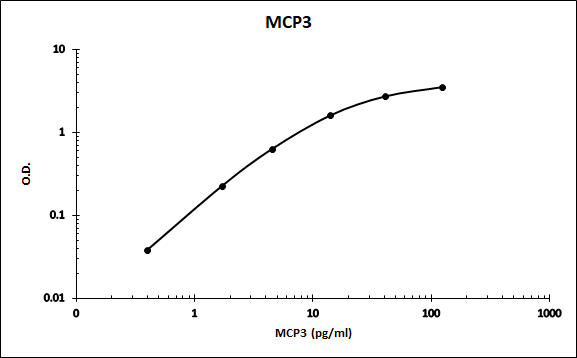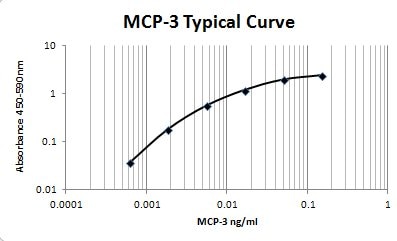Recombinant Human CCL7/MCP-3 Protein Summary
Product Specifications
Gln34-Leu109
Analysis
Product Datasheets
Carrier Free
CF stands for Carrier Free (CF). We typically add Bovine Serum Albumin (BSA) as a carrier protein to our recombinant proteins. Adding a carrier protein enhances protein stability, increases shelf-life, and allows the recombinant protein to be stored at a more dilute concentration. The carrier free version does not contain BSA.
In general, we advise purchasing the recombinant protein with BSA for use in cell or tissue culture, or as an ELISA standard. In contrast, the carrier free protein is recommended for applications, in which the presence of BSA could interfere.
282-P3
| Formulation | Lyophilized from a 0.2 μm filtered solution in Acetonitrile and TFA with BSA as a carrier protein. |
| Reconstitution | Reconstitute at 100 μg/mL in sterile PBS containing at least 0.1% human or bovine serum albumin. |
| Shipping | The product is shipped at ambient temperature. Upon receipt, store it immediately at the temperature recommended below. |
| Stability & Storage: | Use a manual defrost freezer and avoid repeated freeze-thaw cycles.
|
282-P3/CF
| Formulation | Lyophilized from a 0.2 μm filtered solution in Acetonitrile and TFA. |
| Reconstitution | Reconstitute at 100 μg/mL in sterile PBS. |
| Shipping | The product is shipped at ambient temperature. Upon receipt, store it immediately at the temperature recommended below. |
| Stability & Storage: | Use a manual defrost freezer and avoid repeated freeze-thaw cycles.
|
Reconstitution Calculator
Background: CCL7/MCP-3/MARC
MCP-2 and CCL7 are two monocyte chemotactic proteins produced by human MG-63 osteosarcoma cells. Both MCP-2 and CCL7 are members of the C-C family of chemokines and share 62% and 71% amino acid sequence identity, respectively, with MCP-1. CCL7 also shares 58% amino acid identity with MCP-2.
CCL7 cDNA encodes a 99 amino acid residue precursor protein from which the N-terminal 23 amino acid residues are cleaved to generate the 76 amino acid residue mature CCL7. Mature CCL7 contains a potential N-linked and several possible O-linked glycosylation sites.
Similarly to other C-C chemokines, all three MCP proteins are monocyte chemoattractants. In addition, the three MCPs can chemoattract activated NK cells as well as CD4+ and CD8+ T lymphocytes. All three cytokines have also been shown to attract eosinophils and induce histamine secretion from basophils.
Citations for Recombinant Human CCL7/MCP-3 Protein
R&D Systems personnel manually curate a database that contains references using R&D Systems products. The data collected includes not only links to publications in PubMed, but also provides information about sample types, species, and experimental conditions.
10
Citations: Showing 1 - 10
Filter your results:
Filter by:
-
Studies with neutralizing antibodies suggest CXCL8-mediated neutrophil activation is independent of C-C motif chemokine receptor-like 2 (CCRL2) ligand binding function
Authors: Z Su, J Brooks, J Pelker, T Andreyeva, H Sobon, R Gifford, M Powers, J Wang, C Dower, M Hegen, D Messing, AD Sheehan, JJ Brennan
PLoS ONE, 2023-01-20;18(1):e0280590.
Species: Human
Sample Types: Transfected Whole Cells
Applications: Bioassay -
CCR3 blockage elicits polyploidization associated with the signatures of epithelial-mesenchymal transition in carcinoma cell lines
Authors: Y Kaibori, D Nagakubo
Cancer Gene Therapy, 2022-09-19;0(0):.
Species: Human
Sample Types: Whole Cells
Applications: Bioassay -
Placental chemokine compartmentalisation: A novel mammalian molecular control mechanism
Authors: KM Lee, GJ Wilson, M Pingen, A Fukuoka, CAH Hansell, R Bartolini, L Medina-Rui, GJ Graham
PLoS Biol., 2019-05-29;17(5):e3000287.
Species: Mouse, Transgenic Mouse
Sample Types: In Vivo
Applications: In Vivo -
Widespread potential for growth-factor-driven resistance to anticancer kinase inhibitors.
Authors: Wilson TR, Fridlyand J, Yan Y, Penuel E, Burton L, Chan E, Peng J, Lin E, Wang Y, Sosman J, Ribas A, Li J, Moffat J, Sutherlin DP, Koeppen H, Merchant M, Neve R, Settleman J
Nature, 2012-07-26;487(7408):505-9.
Species: Human
Sample Types: Whole Cells
Applications: Bioassay -
Tumor-stromal crosstalk in invasion of oral squamous cell carcinoma: a pivotal role of CCL7.
Authors: Jung DW, Che ZM, Kim J, Kim K, Kim KY, Williams D, Kim J
Int. J. Cancer, 2010-07-15;127(2):332-44.
Species: Human
Sample Types: Whole Cells
Applications: Bioassay -
CCL19 is a specific ligand of the constitutively recycling atypical human chemokine receptor CRAM-B.
Authors: Leick M, Catusse J, Follo M, Nibbs RJ, Hartmann TN, Veelken H, Burger M
Immunology, 2009-12-02;129(4):536-46.
Species: Human
Sample Types: Whole Cells
Applications: Bioassay -
Normalizing the bone marrow microenvironment with p38 inhibitor reduces multiple myeloma cell proliferation and adhesion and suppresses osteoclast formation.
Authors: Nguyen AN, Stebbins EG, Henson M, O'Young G, Choi SJ, Quon D, Damm D, Reddy M, Ma JY, Haghnazari E, Kapoun AM, Medicherla S, Protter A, Schreiner GF, Kurihara N, Anderson J, Roodman GD, Navas TA, Higgins LS
Exp. Cell Res., 2006-04-04;312(10):1909-23.
Species: Human
Sample Types: Whole Cells
Applications: Bioassay -
CC chemokines and transmigration of eosinophils in the presence of vascular cell adhesion molecule 1.
Authors: Yamamoto H, Nagata M, Sakamoto Y
Ann. Allergy Asthma Immunol., 2005-02-01;94(2):292-300.
Species: Human
Sample Types: Cell Culture Supernates
Applications: Bioassay -
Plasmacytoid dendritic cell recruitment by immobilized CXCR3 ligands.
Authors: Kohrgruber N, Groger M, Meraner P, Kriehuber E, Petzelbauer P, Brandt S, Stingl G, Rot A, Maurer D
J. Immunol., 2004-12-01;173(11):6592-602.
Species: Human
Sample Types: Whole Cells
Applications: Bioassay -
Identification of full, partial and inverse CC chemokine receptor 3 agonists using [35S]GTPgammaS binding.
Authors: Wan Y, Jakway JP, Qiu H, Shah H, Garlisi CG, Tian F, Ting P, Hesk D, Egan RW, Billah MM, Umland SP
Eur. J. Pharmacol., 2002-12-05;456(1):1-10.
Species: Human
Sample Types: Whole Cells
Applications: Bioassay
FAQs
No product specific FAQs exist for this product, however you may
View all Proteins and Enzyme FAQsReviews for Recombinant Human CCL7/MCP-3 Protein
Average Rating: 5 (Based on 2 Reviews)
Have you used Recombinant Human CCL7/MCP-3 Protein?
Submit a review and receive an Amazon gift card.
$25/€18/£15/$25CAN/¥75 Yuan/¥2500 Yen for a review with an image
$10/€7/£6/$10 CAD/¥70 Yuan/¥1110 Yen for a review without an image
Filter by:




